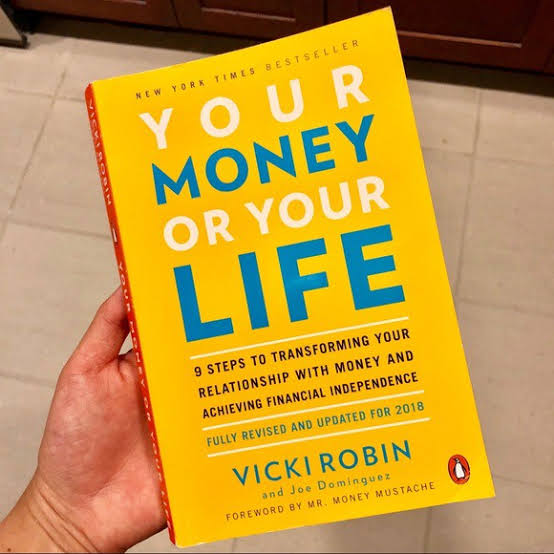
“Your Money or Your Life” offers a comprehensive program to transform one’s relationship with money and achieve financial independence. The book argues that by redefining success, tracking expenses, minimizing debt, and valuing time over money, individuals can lead more purposeful lives. Through a nine-step process, readers are encouraged to view money as a tool for living in alignment with their values rather than as an end in itself. The emphasis is on frugality, reducing consumption, and finding fulfillment in non-materialistic pursuits.
In essence, Robin challenges readers to reconsider their financial habits and priorities, promoting a life of greater freedom and fulfillment.
The nine steps from “Your Money or Your Life” by Vicki Robin and Joe Dominguez are:
1. Making Peace with the Past: Track and categorize every cent you’ve ever earned and spent to see your entire lifetime money flow.
2. Being in the Present – Tracking Your Life Energy: Calculate your real hourly wage (after work-related expenses and time) to determine how much “life energy” you’re spending for money.
3. Monthly Tabulation: Track every cent that comes in or goes out, and convert money spent into hours of life energy to evaluate the true worth of your expenses.
4. Three Questions That Will Transform Your Life: For each expense, ask:
– Did I receive fulfillment, satisfaction, and value in proportion to the life energy spent?
– Is this expenditure of life energy in alignment with my values and life purpose?
– How might this expenditure change if I didn’t have to work for money?
5. Making Life Energy Visible: Create a large chart plotting monthly expenses and income, allowing you to visualize your financial progress.
6. Valuing Your Life Energy – Minimizing Spending: Learn to live frugally by reducing unnecessary expenses, maximizing savings, and getting more value for your life energy.
7. Valuing Your Life Energy – Maximizing Income: Explore ways to increase your income while ensuring your job aligns with your values.
8. Capital and the Crossover Point: Invest your savings in safe, income-producing assets until your investment income surpasses your monthly expenses. This is the “crossover point” where you’re financially independent.
9. Managing Your Finances: Continue investing wisely, living frugally, and re-evaluating your relationship with money and work.
By following these steps, the book aims to help readers achieve financial independence and a more purposeful relationship with money.